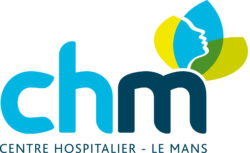Perti’SAM – Design and development of a web application for decision support during prescription appropriateness reviews to limit iatrogenic drug use
Supervisors: Elsa Jouhanneau-Treton (CHM), Valérie Renault (CREN), Nathalie Camelin (LIUM), Catherine Cléder (CREN)
Hosting labs: Centre Hospitalier du Mans – Le Mans Université, labs CREN (Centre de Recherche en Education de Nantes – site Le Mans) and LIUM (Laboratoire d’Informatique de l’Université du Mans). Le stage se déroulera en présentiel.
Place: Le Mans Université et Centre Hospitalier du Mans, Possible trips to Laval et Angers
Contacts: Elsa Jouhanneau-Treton (ejouhanneau@ch-lemans.fr), Valérie Renault (valerie.renault@univ-lemans.fr), Nathalie Camelin (nathalie.camelin@univ-lemans.fr), Catherine Cléder (catherine.cleder@univ-lemans.fr).
Application: Send a CV, a covering letter relevant to the proposed subject, your grades for the last two years of study and the possibility of attaching letters of recommendation to all the supervisors, before December 18, 2023
Context: When an elderly patient over the age of 65 arrives at the emergency department, the reason for consultation is often a fall or feeling unwell. When their medication is investigated, the patient is often found to be taking more than one drug (more than 5), which can lead to undesirable effects due to interactions between these drugs (iatrogenic drug use). Elderly patients are more susceptible to iatrogenic drug therapy, and this is the cause of many hospitalisations. Hospital pharmacists must therefore study the drugs prescribed to patients and their appropriateness: this is the Prescription Appropriateness Review.
During these reviews, the pharmacist will have to use his or her knowledge, as well as different tools and sources of information, to suggest changes in treatment, dosage adjustments, discontinuation of treatment, etc. to the doctor. These relevance reviews are specific to a hospital centre. During these reviews, we can observe practices that are not pooled, as they often depend on the pharmacist’s experience and specific training.
Medical data is complex and extensive. Scientific advances are not always included in the summary of product characteristics. Each pharmaceutical company defines its own descriptions of its medicines, and these descriptions are not governed by a single standard. However, existing applications do not contain all the information pharmacists need for their relevance review, nor do they allow for the sharing of expertise.
The general aim of the research project is to create and evaluate an application to help pharmacists carry out relevance reviews of prescriptions for patients aged over 65, taking into account similar applications already existing.
Your missions:
Several assignments can be prioritised and allocated according to the progress of the project, and even the preferences of the student involved in the project:
- HCI and UX Design: Continuing the detailed analysis of needs and identification of the functionalities required for a relevance review based on existing applications (Vidal, Yatro, etc.) and on the practices of pharmacists at the CHM, Laval Hospital and Angers University Hospital;
- Development of web services: Continue to integrate available data already identified and design web services to use this data (Excel data from the CHM, gerontology files, etc.);
- AI: A number of approaches are currently being considered and could be the subject of proofs of concept: web agents, pattern detection in drug interactions, automated medical data mining (structured or non-standardised depending on the source), etc.
Technologies : Web and database technologies such as API Rest, Angular, Python, Flask.
Partners : Regular working meetings with pharmacists from the various hospitals involved in the project, which may involve travelling to the CHM.
Bibliography – Webography
[1] Jouhanneau, E & Fratta, A & Auvrignon, A & Descout, J. (2017). PS-064 Impact of remedial actions after a risk analysis by a failure mode effects and consequences analysis on pharmaceutical interventions in a paediatric hospital. Eur J Hosp Pharm. 24. A255.2-A255. doi:10.1136/ejhpharm-2017-000640.570.
[2] Jouhanneau, Elsa & Imbert, Camille & Auvrignon, Anne & Fratta, Anne & Descout, Jerome. (2016). Évaluation prospective des interventions pharmaceutiques dans un hôpital pédiatrique et analyse des risques selon la méthode AMDEC (analyse des modes de défaillance, de leurs effets et de leur criticité). Le Pharmacien Hospitalier et Clinicien. 51. 79. doi:10.1016/j.phclin.2016.01.041.
[3] Vidal – « VIDAL Sentinel, le monitoring en temps réel des risques de prescriptions » – https://www.vidalfrance.com/solutions/vidal-sentinel
[4] SFGG – «YATRO», un dispositif unique en France pour lutter contre l’iatrogénie médicamenteuse – https://sfgg.org/espace-presse/communiques-de-presse/yatro-un-dispositif-unique-en-france-pour-lutter-contre-liatrogenie- medicamenteuse/ – Février 2022
[5] Inserm – Intelligence artificielle : va-t-elle remplacer le diagnostic médical ? Inserm n°57 – https://www.inserm.fr/actualite/intelligence-artificielle-va-t-elle-remplacer-le-diagnostic-medical/ – 13/07/2023
[6] Loïck Bourdois, Marta Avalos, Gabrielle Chenais, Benjamin Contrand, Cédric Gil-Jardiné, et al.. Traitement automatique des résumés de passages aux urgences : focus sur la désidentification. PFIA 2021 – Santé et I.A., Journée organisée avec le soutien de l’Association française d’Informatique Médicale (AIM) et le Collège Science de l’Ingénierie des Connaissances de l’AFIA dans le cadre de la Plate-Forme Intelligence Artificielle (PFIA), Jun 2021, Bordeaux / Virtual, France. ⟨hal- 03276124⟩
[7] Chenais G, Gil-Jardiné C, Touchais H, Avalos Fernandez M, Contrand B, Tellier E, Combes X, Bourdois L, Revel P, Lagarde E, Deep Learning Transformer Models for Building a Comprehensive and Real-time Trauma Observatory: Development and Validation Study JMIR AI 2023;2:e40843 doi: 10.2196/40843




 Français
Français